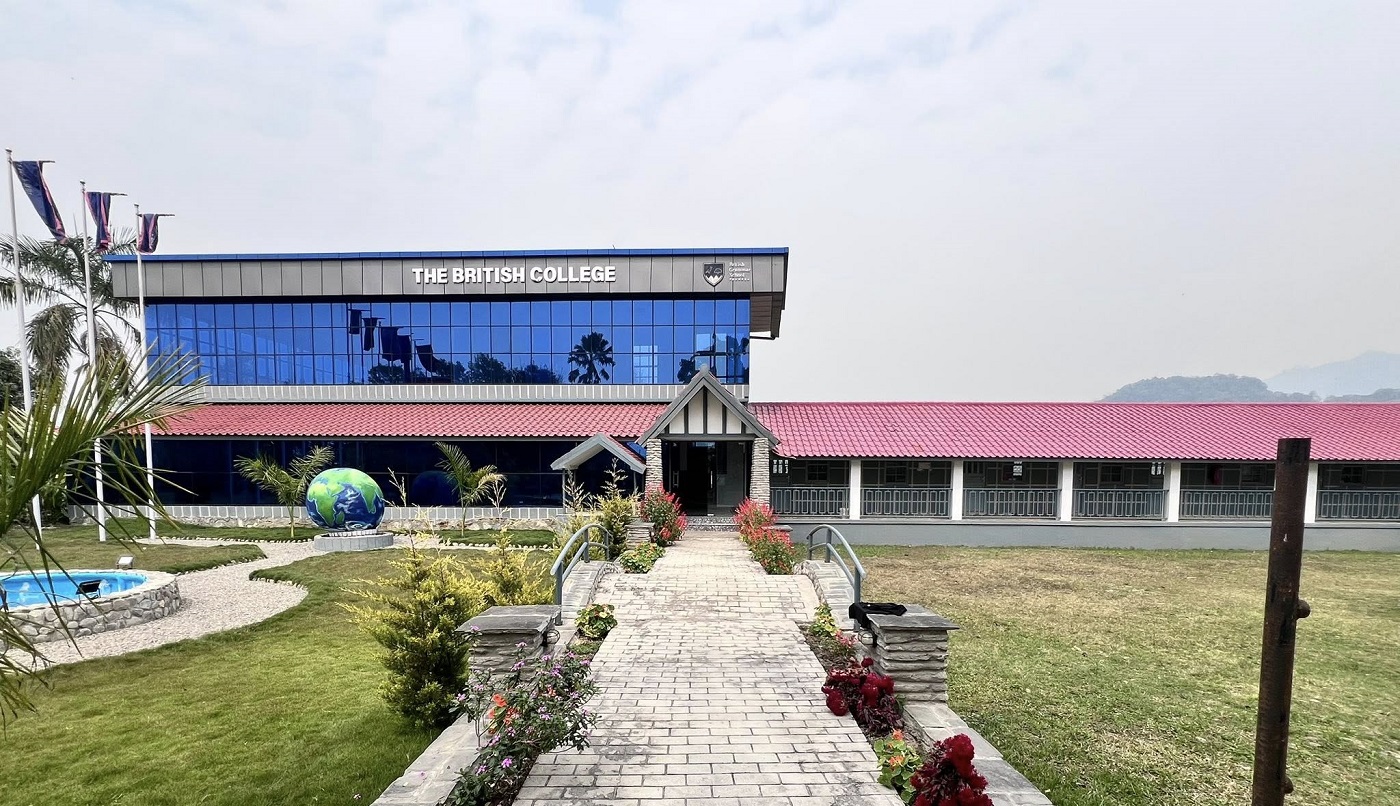Overview
GCE A Level Science at Cosmos International College, Pokhara
If you plan to study medicine, engineering, IT, or research, the GCE A Level Science at Cosmos International College, Pokhara gives you a clear path. This guide explains the Cambridge A Levels Science stream in Nepal—subjects, curriculum, exams, admission requirements, facilities, scholarships, and career options—in simple language for students and parents.

Overview
Cosmos International College (CIC) runs the Cambridge AS and A Level Science programme in Khudi, Pokhara. The centre operates under the academic management of The British College, Kathmandu, using Cambridge Assessment International Education standards. Teaching takes place in English, and laboratories, computer rooms, and an e-library support day-to-day study.
Highlights
-
Location: Khudi, Pokhara
-
Qualification: Cambridge AS and A Level (Science stream)
-
Exam series: May/June and Oct/Nov; results in August and January
-
Teaching language: English
-
Management link: The British College, Kathmandu
-
Facilities: Science labs, computer labs, e-library, Wi-Fi, transport
-
Support: Merit- and need-based scholarships; academic counselling
Curriculum Details
You study across two years. AS units generally run in Year 1; A Level units extend learning in Year 2. Students usually select three full subjects plus English General Paper (EGP).
Science subject options commonly offered at CIC
-
Physics
-
Chemistry
-
Biology
-
Mathematics
-
Computer Science
-
English General Paper
Here’s how combinations typically align with goals:
-
Medicine, dentistry, pharmacy: Biology, Chemistry, Mathematics (EGP)
-
Engineering, computing, data-focused fields: Mathematics, Physics, Computer Science (EGP)
-
Life sciences, agriculture, environment: Biology, Chemistry, Mathematics or Computer Science (EGP)
Cambridge grading ranges from A* to E; U means ungraded. Practical skills matter in sciences, so expect regular lab work, written papers, and structured questions that test problem solving and application.
Objectives
You want clarity, strong basics, and a firm university pathway. This course helps you:
-
Build solid knowledge in Physics, Chemistry, Biology, Mathematics, and Computer Science
-
Practice scientific investigation and reporting
-
Strengthen quantitative reasoning and exam technique
-
Prepare for university entry in Nepal or abroad
Not sure which mix suits your plan? A brief counselling session during admission helps match subjects to target programmes.
Scope
The Science stream keeps options open:
-
Health pathways: MBBS, BDS, Pharmacy, Nursing, Public Health, Biomedical fields
-
Engineering and tech: Civil, Electrical, Mechanical, Computer, AI/ML foundations, Software
-
Pure and applied sciences: Physics, Chemistry, Biology, Environmental Science, Agriculture
-
Interdisciplinary routes: Biotechnology, Food Tech, Geomatics, Data-focused degrees
Learning Outcomes
By the end of A Levels, you should be able to:
-
Explain core principles and solve structured problems in your subjects
-
Carry out experiments safely and record reliable data
-
Interpret graphs, tables, and real datasets
-
Write clear, concise answers using correct scientific and mathematical language
-
Manage time and strategy for multi-paper exams
Skill Development Modules
Students often ask, “What skills will I actually use?” Here is what you practice week to week:
-
Lab practice and safety: planning, apparatus use, observation, error checks
-
Numerical methods: algebra, calculus basics, vectors, statistics (per subject scope)
-
Data handling: plotting, modelling, evaluating uncertainty
-
Scientific writing: lab reports, hypothesis framing, evidence-based conclusions
-
Problem solving: multistep questions, past-paper drills, reflection on mistakes
-
Digital literacy: simulations, spreadsheets, coding basics in Computer Science
Teaching Methodology
Classes combine short explanations, guided examples, and independent practice. Lab sessions reinforce theory. Teachers use past-paper walkthroughs, topic tests, and term reviews. Parents receive updates during scheduled meetings so support at home stays consistent.
Concerned about pace? Foundation refreshers in maths and basic science concepts help you settle in during the first weeks.
Admission Requirements
-
Qualification: SEE/GCSE/CBSE or equivalent at the time of admission
-
Minimum GPA (SEE Nepal Board): 2.8 for Science; 2.4 for Non-Science
-
Entrance: The British College A Level Entrance Exam
-
Interview: Applicant meets the academic team; a guardian attends
-
Application: Forms available on the college website; support provided on campus
Strong grades in Mathematics and Science are advantageous for Physics, Chemistry, and Biology tracks. Bring your mark sheets and identification for verification during processing.
Career Opportunities
Graduates move into:
-
Medical and health: MBBS, BDS, BPharm, Nursing, Allied Health
-
Engineering and IT: BE/BTech, Computer Science, Software Engineering
-
Science and research: BSc programmes in Physics, Chemistry, Biology, Environmental Science
-
Other options: Agriculture, Food Science, Biotechnology, Data-oriented degrees
Universities in Nepal accept Cambridge A Levels; international admissions consider A Levels as standard entry qualifications. Course-specific tests or interviews may apply depending on the university and country.
Scholarships and Financial Aid
CIC offers:
-
Merit awards based on prior results or top performance during the programme
-
Need-based support for students from low-income families
-
Recognition for leadership, community work, or outstanding progress
Documents may be required to assess eligibility. Details are shared during admission counselling.
Why Choose This Course?
-
Cambridge Science subjects remain widely accepted by universities
-
Flexible combinations fit medicine, engineering, IT, and research tracks
-
Practical lab work builds confidence for university practicals
-
Regular assessments and feedback keep preparation on track
-
Access to experienced teachers who understand Cambridge papers and marking styles
Conclusion
Students who want clear pathways into medicine, engineering, or science degrees benefit from the A Level Science stream at Cosmos International College, Pokhara. Careful subject selection, steady lab work, and consistent practice across two years create a strong base for university life and future careers.
FAQ
How many subjects should I take?
Three full A Levels plus English General Paper is the standard plan for most university entries.
When are the exams?
Cambridge runs sessions in May/June and October/November. Results usually publish in August and January.
How is grading done?
A*, A, B, C, D, E are passing grades; U is ungraded.
Do labs count toward my grade?
Science papers include practical components or practical assessments as set by Cambridge. Your teachers prepare you through scheduled lab work.
Which subjects should I take for medicine?
Many applicants choose Biology, Chemistry, Mathematics plus EGP. Always check target university entry rules.
Is Mathematics compulsory for Science?
Mathematics strengthens applications for engineering and many science degrees. Medicine often expects Mathematics at least to AS level; verify with target universities.
Are scholarships available?
Yes. Merit-based and need-based options exist. Criteria and documents are reviewed during admission.
Can I apply from CBSE or GCSE?
Yes. Students from CBSE, GCSE, and equivalent systems may apply subject to entrance test and interview.


















